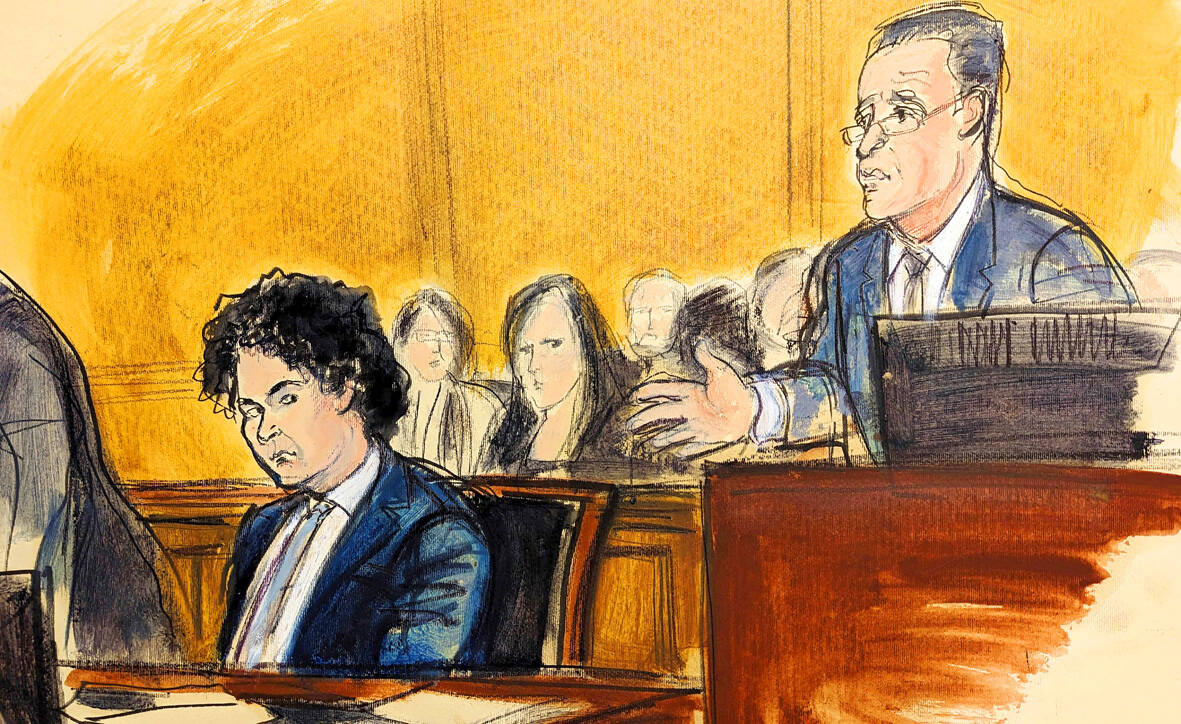FTX cofounder Sam Bankman-Fried while on bail should be allowed a cellphone with no Internet capability and a basic laptop with limited functions, but forbidden from using other electronic communication devices, the US Department of Justice said.
The proposal to limit the his communications was filed late on Friday in Manhattan Federal Court in New York, on behalf of the government and Bankman-Fried’s defense team.
It requires approval by US District Judge Lewis Kaplan, who oversees the case.

Photo: AP
Kaplan had signaled at a Feb. 16 hearing that he might jail Bankman-Fried, 30, for testing the limits of his US$250 million bail package by communicating in ways that could not be monitored.
The judge said he did not want to set Bankman-Fried “loose in this garden of electronic devices,” following accusations that he tried to contact possible government witnesses, and used a virtual private network to watch football.
Bankman-Fried pleaded not guilty after prosecutors said he stole billions of US dollars of FTX customer funds to plug losses at his Alameda Research hedge fund.
He faces 12 criminal charges under an indictment made public on Feb. 23.
The proposed non-smartphone for Bankman-Fried would be limited to voice calls and SMS text messages.
Laptop Internet use would be restricted to specified virtual private networks, 23 Web sites for personal use covering news, sports and food delivery, and other Web sites.
Bankman-Fried is living under house arrest with his parents in Palo Alto, California.
His parents agreed to submit sworn affidavits that they would not bring other electronic devices into their home or let their son use theirs.

CHIP RACE: Three years of overbroad export controls drove foreign competitors to pursue their own AI chips, and ‘cost US taxpayers billions of dollars,’ Nvidia said China has figured out the US strategy for allowing it to buy Nvidia Corp’s H200s and is rejecting the artificial intelligence (AI) chip in favor of domestically developed semiconductors, White House AI adviser David Sacks said, citing news reports. US President Donald Trump on Monday said that he would allow shipments of Nvidia’s H200 chips to China, part of an administration effort backed by Sacks to challenge Chinese tech champions such as Huawei Technologies Co (華為) by bringing US competition to their home market. On Friday, Sacks signaled that he was uncertain about whether that approach would work. “They’re rejecting our chips,” Sacks

NATIONAL SECURITY: Intel’s testing of ACM tools despite US government control ‘highlights egregious gaps in US technology protection policies,’ a former official said Chipmaker Intel Corp has tested chipmaking tools this year from a toolmaker with deep roots in China and two overseas units that were targeted by US sanctions, according to two sources with direct knowledge of the matter. Intel, which fended off calls for its CEO’s resignation from US President Donald Trump in August over his alleged ties to China, got the tools from ACM Research Inc, a Fremont, California-based producer of chipmaking equipment. Two of ACM’s units, based in Shanghai and South Korea, were among a number of firms barred last year from receiving US technology over claims they have

It is challenging to build infrastructure in much of Europe. Constrained budgets and polarized politics tend to undermine long-term projects, forcing officials to react to emergencies rather than plan for the future. Not in Austria. Today, the country is to officially open its Koralmbahn tunnel, the 5.9 billion euro (US$6.9 billion) centerpiece of a groundbreaking new railway that will eventually run from Poland’s Baltic coast to the Adriatic Sea, transforming travel within Austria and positioning the Alpine nation at the forefront of logistics in Europe. “It is Austria’s biggest socio-economic experiment in over a century,” said Eric Kirschner, an economist at Graz-based Joanneum

OPTION: Uber said it could provide higher pay for batch trips, if incentives for batching is not removed entirely, as the latter would force it to pass on the costs to consumers Uber Technologies Inc yesterday warned that proposed restrictions on batching orders and minimum wages could prompt a NT$20 delivery fee increase in Taiwan, as lower efficiency would drive up costs. Uber CEO Dara Khosrowshahi made the remarks yesterday during his visit to Taiwan. He is on a multileg trip to the region, which includes stops in South Korea and Japan. His visit coincided the release last month of the Ministry of Labor’s draft bill on the delivery sector, which aims to safeguard delivery workers’ rights and improve their welfare. The ministry set the minimum pay for local food delivery drivers at